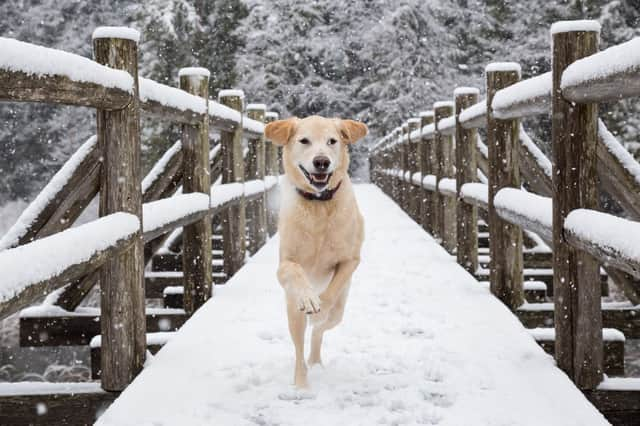Dog Care in Winter: Here are 10 ways to keep your adorable dog healthy and happy when it's cold outside 🐶
This article contains affiliate links. We may earn a small commission on items purchased through this article, but that does not affect our editorial judgement.


The UK is in the middle of a cold snap this week, with temperatures dropping well below zero across Scotland.
Of course family dogs still need walks and outdoor exercise so, to help out, TrustedHousesitters have teamed up with veterinary surgeon Rebecca MacMillan to share expert advice for pet owners to keep their pups safe in freezing temperatures.
Advertisement
Hide AdAdvertisement
Hide AdRebecca explained: “Most of us take sensible actions over the winter to look after ourselves, but we also need to think about how to keep our pets safe. The chilly weather can be enjoyed safely with our furry companions as long as you take a few simple precautions.”
Here are vet Rebecca’s 10 top tips for looking after your pet in extreme cold:
Protect the paws
Salt and ice-melting chemicals can be harmful to your pet's paws. Grit and rock salt can be irritating to sensitive paws, and your pet may also ingest it as he grooms himself. Antifreeze is also a danger at this time of year, so if you think it has accidentally stepped in a spillage outside, then washing your pet's paws will help. Make sure to clean your dog’s paws after walks and use a soothing balm to rehydrate them.
Monitor food intake
Some pets may require additional calories during the cold weather to generate energy and stay warm, while some need a decrease in calories. Many of us spend more time indoors in the winter months, which means our pets do too. Being less active means pets' energy requirements may reduce over the winter months. Monitor your pet’s weight carefully and go easy on treats and titbits to avoid an expanding waistline. Conversely, animals that live or work outdoors may actually need more calories in the winter, so monitor their body condition closely.
Keep a full water bowl
It’s a common misconception that pets are only at risk for dehydration in warm temperatures. However, cold weather can contribute to dehydration in pets, so make sure they always have access to fresh water.
Be cautious with space heaters
Keep pets away from space heaters and other heat sources, as they can cause burns or start fires if knocked over. Pick one with an anti-tip feature to prevent it from being knocked over and a cool-touch exterior to prevent burning Put it in a low-traffic area to further limit the risks of injury.
Don’t leave pets in the car
While many pet owners understand the dangers of leaving pets in hot cars, cold cars can be just as dangerous for pets. The interior of a car holds in cold like a refrigerator, which can cause animals to freeze.
Keep baths to a minimum
Like humans, it’s common for pets to get dry, itchy and flaky skin in cold weather. Experts recommend that pet owners keep bathing to a minimum and keep their homes humidified to avoid dry skin on pets during the winter.
Check your engine
Advertisement
Hide AdAdvertisement
Hide AdSometimes cats use warm engines as a heat source in cold temperatures. Before using your vehicle, ensure outdoor animals’ safety by checking underneath your car for any furry visitors.
Stay up to date on vaccines
Make sure your pet's vaccinations are current, as cold weather can increase their risk of contracting certain illnesses.
Watch for signs of hypothermia and frostbite
If your pet exhibits symptoms such as shivering, lethargy, ice on their body, or discolored skin, contact your local vet immediately. Check your pet's ears, tail, and paws regularly for signs of frostbite, which can appear as pale or gray skin that's cold to the touch.
Prepare for power outages
In case of power outages or the event of being snowed in, make sure you have enough supplies to keep you going for a few days, this includes any regular medication that your pet is on, as well as pet food.
Comments
Want to join the conversation? Please or to comment on this article.